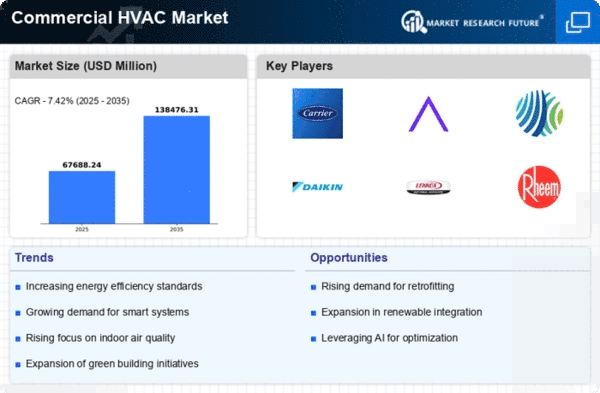Top Industry Leaders in the Commercial HVAC Market
The commercial HVAC market, responsible for climate control in offices, hotels, schools, and other large buildings, is a complex and fiercely competitive space. Established giants lock horns with innovative startups, all vying for a slice of this lucrative pie. Understanding the strategies, trends, and key players shaping this dynamic landscape is crucial for navigating the market effectively.
Top Companies in the Commercial HVAC industry includes,
Panasonic
Mitsubishi Corporation
Samsung Electronics Co. Ltd
Daikin Industries Ltd
Haier Electronics Group Co. Ltd
Ingersoll Rand
Johnson Controls
Farina Corporation
Edison Heating and Cooling
Lennox International Inc, and others.
Key Player Strategies:
Global Titans: Carrier, Johnson Controls, and Trane leverage their extensive experience, established sales networks, and diverse product portfolios to maintain their dominance. They cater to a wide range of building types and sizes, prioritizing reliability, efficiency, and service capabilities. Carrier's AquaChill series of water-cooled chillers exemplifies their commitment to innovative and efficient solutions.
Technology Disruptors: Startups like Daikin Applied and Mitsubishi Heavy Industries Climate Control Systems (MHI-CCS) are disrupting the market with cutting-edge technologies like variable refrigerant flow (VRF) systems, smart controls, and cloud-based monitoring. They cater to tech-savvy customers seeking high efficiency, remote management, and data-driven optimization. Daikin's VRV IV+ systems showcase their focus on advanced climate control solutions.
Cost-Effective Challengers: Chinese manufacturers like Gree and Midea are making waves with competitively priced HVAC systems, targeting budget-conscious buyers. They focus on value for money, offering basic functionalities without compromising quality. Gree's G-Tech inverter technology exemplifies their commitment to affordable efficiency.
Sustainability Champions: Companies like Danfoss and Lennox prioritize eco-friendly practices, utilizing recycled materials, offering low-GWP refrigerants, and promoting energy-efficient solutions. They cater to environmentally conscious customers and leverage sustainability as a competitive advantage. Danfoss' Turbocor compressors illustrate their focus on energy-efficient and sustainable cooling technology.
Factors for Market Share Analysis:
Product Portfolio Breadth: Offering a diverse range of HVAC systems for various building types (offices, hospitals, factories) and capacities caters to a wider customer base. Companies with comprehensive portfolios gain an edge.
Technology Innovation: Investing in R&D for next-generation technologies like intelligent controls, cloud-based platforms, and energy-efficient systems is crucial for staying ahead of the curve. Companies leading in innovation attract early adopters.
Cost and Affordability: Balancing cutting-edge technology with competitive pricing is crucial for mass adoption, particularly in budget-conscious sectors. Companies offering cost-effective solutions without compromising quality stand out.
Energy Efficiency and Sustainability: Meeting stringent energy regulations, utilizing low-carbon refrigerants, and minimizing environmental impact are becoming increasingly important. Companies demonstrating environmental consciousness attract both ethical clients and regulatory benefits.
New and Emerging Trends:
Building Intelligence Integration: Integrating HVAC systems with smart building automation platforms enhances energy management, optimizes comfort, and facilitates predictive maintenance. Companies offering seamless integration solutions cater to the growing demand for connected buildings.
Cloud-Based Monitoring and Control: Real-time remote monitoring and control capabilities via cloud platforms offer enhanced performance management, troubleshooting ease, and data-driven optimization. Companies providing these features attract customers seeking centralized control and data insights.
Focus on Indoor Air Quality (IAQ): Providing solutions for improved IAQ through air filtration, ventilation systems, and monitoring technologies is gaining traction due to health concerns and evolving regulations. Companies addressing IAQ needs stand out in building healthier environments.
Modular and Pre-Fabricated Systems: Prefabricated HVAC systems offer faster installation, easier maintenance, and potentially lower costs. Companies adopting modularity cater to the demand for faster construction and efficient project management.
Overall Competitive Scenario:
The commercial HVAC market is a dynamic and complex space with diverse players employing varied strategies. Established giants leverage their reach and diverse portfolios, while technology disruptors introduce innovative features. Cost-effective challengers cater to budget-conscious buyers, and sustainability champions attract environmentally conscious customers. Factors like product portfolio, technological innovation, affordability, and energy efficiency play a crucial role in market share analysis. New trends like building intelligence integration, cloud-based control, IAQ focus, and modular systems offer exciting growth opportunities. To succeed in this evolving market, players must prioritize innovation, cater to specific customer needs, embrace sustainable practices, and explore technology-driven solutions. By aligning their strategies with market trends and customer demands, they can secure a cool future in this ever-chilling competitive landscape.
Industry Developments and Latest Updates:
Panasonic:
- October 26, 2023: Announced launch of new ECOi VRF series with enhanced efficiency and AI-powered controls. (Source: Panasonic press release)
Mitsubishi Corporation:
- November 15, 2023: Announced investment in ClimaTech, a provider of sustainable cooling solutions. (Source: Mitsubishi Corporation press release)
Samsung Electronics Co. Ltd:
- September 8, 2023: Launched its WindFree AC series in India with AI-powered cooling technology. (Source: Samsung India press release)
Haier Electronics Group Co. Ltd:
- November 2, 2023: Announced launch of its new U-Match VRF series with Wi-Fi connectivity and cloud-based controls. (Source: Haier press release)
Ingersoll Rand:
- October 17, 2023: Acquired ClimateMaster, a leading provider of geothermal HVAC systems. (Source: Ingersoll Rand press release)
Johnson Controls:
- September 20, 2023: Launched its YORK YMC13 high-efficiency chiller series with R-31 refrigerant. (Source: Johnson Controls press release)










